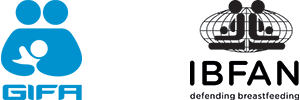
The Lancet publishes a new series on breastfeeding, following up on the 2016 series that showed the benefits of breastfeeding for developed countries, the health of babies and mothers, and the large savings in healthcare costs. In 2023, the Lancet looks at the aggressive marketing by companies that undermine support for breastfeeding.
The marketing strategies are multiple and insidious, exploiting new parents’ fear and doubt about the value of breastfeeding and even their ability to care for their babies well. They also target the health professions and policy makers. It is time to put breastfeeding back at the centre of health policy – This Lancet series includes an editorial, three articles and a commentary.
Summary
Breastfeeding has proven health benefits for both mothers and babies in high-income and low-income settings alike. Yet, less than 50% of babies worldwide are breastfed according to WHO recommendations. For decades, the commercial milk formula industry has used underhand marketing strategies, designed to prey on parents’ fears and concerns, to turn the feeding of infants and young children into a multibillion-dollar business—generating revenues of about $55 billion each year.
Presentation
The three-paper Series outlines how typical infant behaviours such as crying, fussiness, and poor night-time sleep are portrayed by the commercial milk formula (CMF) industry as pathological and framed as reasons to introduce formula, when in fact these behaviours are common and developmentally appropriate.
However, manufacturers claim their products can alleviate discomfort or improve night-time sleep, and also infer that formula can enhance brain development and improve intelligence—all of which are unsubstantiated.
Infant feeding is further commodified by cross-promotion of infant, follow-on, toddler, and growing-up milks using the same branding and numbered progression, which aims to build brand loyalty and is a blatant attempt to circumvent legislation that prohibits advertising of infant formula.
Breastfeeding has proven health benefits across high-income and low-income settings alike: it reduces childhood infectious diseases, mortality, and malnutrition, and the risk of later obesity; mothers who breastfeed have decreased risk of breast and ovarian cancers, type 2 diabetes, and cardiovascular disease.
The role of the International Code
However, despite repeated calls for governments to incorporate the Code’s recommendations ) Code of 1981 and about 20 Resolutions) into legislation, only 32 countries have legal measures that substantially align with the Code. A further 41 countries have legislation that moderately aligns with the Code and 50 have no legal measures at all. As a result, the Code is regularly flouted without penalty.
Some commercial milk formula CMF lobby groups have cautioned against improved parental leave. Duration of paid maternity leave is correlated with breastfeeding prevalence and duration, and absence of, or inadequate, paid leave forces many mothers to return to work soon after childbirth.
Women’s choice – based on accurate information
Some women choose not to breastfeed, or are unable to. Perceived pressure, or inability, to breastfeed—especially if it is at odds with a mother’s wishes—can have a detrimental effect on mental health, and systems should be in place to fully support all mothers in their choices. Women and families make decisions about infant feeding based on the information they receive, and a criticism of the CMF industry’s predatory marketing practices should not be interpreted as a criticism of women. All information that families receive on infant feeding must be accurate and independent of industry influence to ensure informed decision making. Marketing by the CMF industry is an interconnected, multifaceted, powerful system that knowingly exploits parents’ aspirations. Under the Convention of the Rights of the Child, governments have a duty to tackle misinformation—and governments need to embrace the breastfeeding Code without further delay to ensure that manufacturers making misleading claims about their products are held to account.
Concluding remarks
Breastfeeding has to be placed at the center of public health considerations and its value must be recognised. This value must be supported by the whole of society and its stakeholders, including the health professions and policy makers.
The Lancet links to the Breastfeeding Series 2023
- General Link https://www.thelancet.com/series/breastfeeding-2023
- Editorial Unveiling the predatory tactics of the formula milk industry
- Pérez-Escamilla et al. Breastfeeding: crucially important, but increasingly challenged in a market-driven world
- Rollins et al .Marketing of commercial milk formula: a system to capture parents, communities, science, and policy
- Baker et al. The political economy of infant and young child feeding: confronting corporate power, overcoming structural barriers, and accelerating progress
- Comment by Doherty et al. Stemming commercial milk formula marketing: now is the time for radical transformation to build resilience for breastfeeding
- Infographics https://www.thelancet.com/pb-assets/Lancet/infographics/the-2023-lancet-series-breastfeeding/lancet_breastfeeding-1675332200247.pdf
To go further
- Launch of the Breastfeeding Series 2023 – streaming of the webinar https://www.who.int/news-room/events/detail/2023/02/08/default-calendar/launch-of-the-2023-lancet-series-on-breastfeeding–including-the-influence-of-commercial-milk-formula-marketing
- The Lancet Breastfeeding Series 2016 https://www.thelancet.com/series/breastfeeding
- GIFA News post https://www.gifa.org/en/corporate-political-activity-cpa-and-impact-on-breastfeeding/
- 2021 : 40 years International Code https://www.gifa.org/en/21-may-2021-40-years-international-code/
- 2022 : WHO Report on exploitative Digital Marketing
